Iran's Sunni Leader Says Secular People Should Be In Government
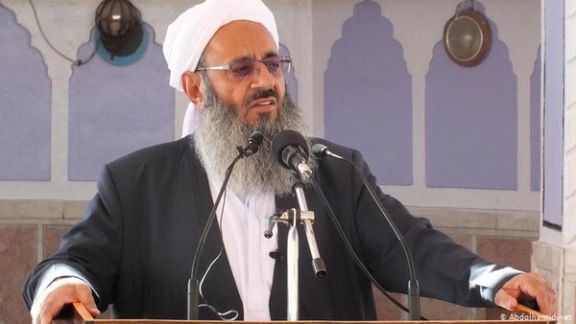
Outspoken Sunni religious leader Mowlavi Abdolhamid says the Iranian government’s mistreatment of political prisoners and forced confessions are un-Islamic.

Outspoken Sunni religious leader Mowlavi Abdolhamid says the Iranian government’s mistreatment of political prisoners and forced confessions are un-Islamic.
During his Friday prayer sermon, the country’s most influential Sunni cleric criticized the “violent treatment” of prisoners by the regime, emphasizing that prisoners should be respected and beating them, insulting them, or putting pressure on them is 'haram,' an Arabic term meaning 'forbidden' in Islamic law or sharia.
"Forced confessions are a violation of the prisoner's right," he said, adding that prisoners should not feel that their interrogators are trying to "attack" them or should not feel that they are stuck in the hands of their "enemies."
Abdolhamid also said officials of the country should be selected from among secular people too, noting that not all Iranian people are "religious", and some do not accept religion. “Don't blame me for this view. Some may not accept religion, but the right policy is that if they have merit and conscience, they should be employed," he added.
He also denounced executions of prisoners in the country, including the hangings over drug-related crimes, saying, "I believe that these executions are not beneficial for the society because drugs are still available as ordinary people do not smuggle them into the country.”
Amid nationwide protests in December, the Islamic Republic hanged four young men arrested during the unrest on spurious charges.
A top advisor to Abdolhamid was arrested earlier in the week, leading to more tensions in Zahedan, capital of Iran's southeastern Sistan-Baluchestan.
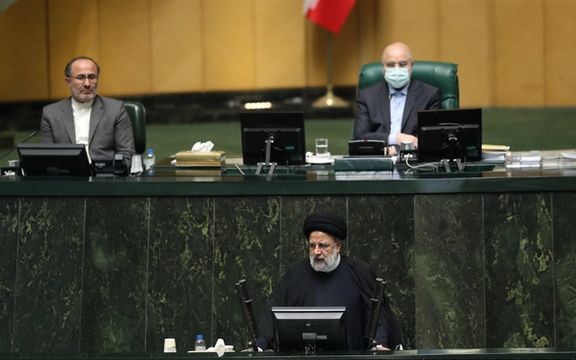
Iranian media say several lawmakers are mulling the idea of questioning President Ebrahim Raisi at the parliament amid the country’s political and economic crises.
Moderate Aftab News website reported that the lawmakers were going around in the parliament (Majles) on January 31, gathering signatures in support of the motion. However, those who support the idea do their best to conceal their identity before the motion is tabled at the Majles.
The website said that the lawmakers appear to fear reactions by Raisi and other ultraconservatives to what they are doing. Nonetheless, their names cannot be kept a secret for long. Aftab News said that they even refused to talk to reporters about the motion that signifies their dissatisfaction about Raisi's performance.
Others at the Majles, including hardliner Mohsen Pirhadi told Aftab News that questioning the president about his performance is not wrong and is part of the parliament's supervisory mandate.
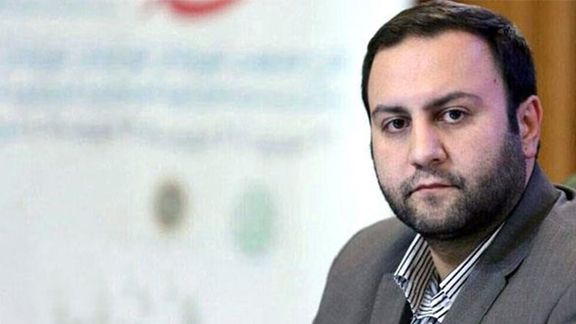
It appears that some cabinet ministers' manoeuvres to evade impeachment pushed the President into the questioning trap. After all, Raisi was the one who did his best to prevent the impeachments regardless of lawmakers' complaints about several cabinet ministers' inefficiency, wrote Aftab News.
Although lawmakers appear to be more determined this time to question Raisi, the website said that it is unlikely most deputies would vote for the motion. Meanwhile, Lawmaker Ahmad Alireza Beigi said he does not believe that Majles would take such a step. However, he said that first, cabinet ministers should be impeached and then if the plan for impeachment does not go ahead smoothly, the lawmakers can question Raisi.
Meanwhile, a Khabar Online website report on February 1 said lawmakers are planning to question Raisi on 6 grounds. According to the website, this is the second call for questioning Raisi during the past 8 months. The first time, only two lawmakers signed the motion. According to the law, at least a quarter of the 290 lawmakers at the Majles need to sign a questioning motion if it is going to go any further.
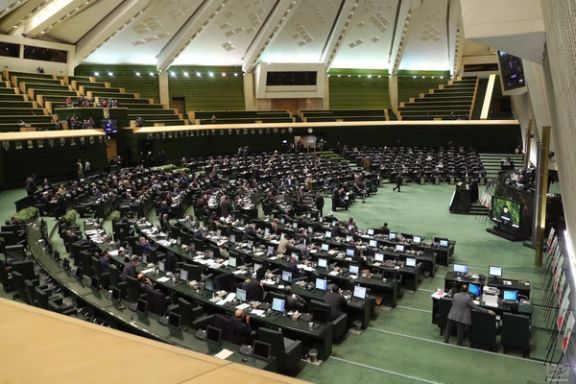
According to Khabar Online, if the motion progresses this time, the lawmakers will ask questions about "the chaotic situation of the forex market and failing to issue electronic coupons to provide essential commodities to the nation."
Khabar Online quoted one of the unnamed lawmakers who was collecting signatures in support of the motion as having said some of his peers have welcomed the idea of questioning the President, but some others are too scared to sign the request for the motion."
In April last year, Lawmaker Mostafa Hosseini Ghotbabadi had even said that lawmakers have called for designating the president as incompetent, a motion that kicked out Iran's first President Abolhassan Banisadr in June 1981.
Raisi has been most recently criticized for feeding the nation with false information and fabricated statistics about his achievements during a televised interview earlier this week. During the past months the figures he presented about inflation, employment and economic growth were seriously challenged by the media and even by hardliner newspapers published by the IRGC.
The media have been questioning Raisi's performance in the areas of housing, employment and controlling prices. The most important point made against Raisi's figures is that while the official inflation rate in January was 51 percent, He still insists that it is no higher than 40 percent.
Iran’s currency, rial has fallen to 450,000 to the US dollar speeding up inflation that is expected soon to surpass the official rate of 51 percent. All government attempts to manipulate the forex market have so far failed.
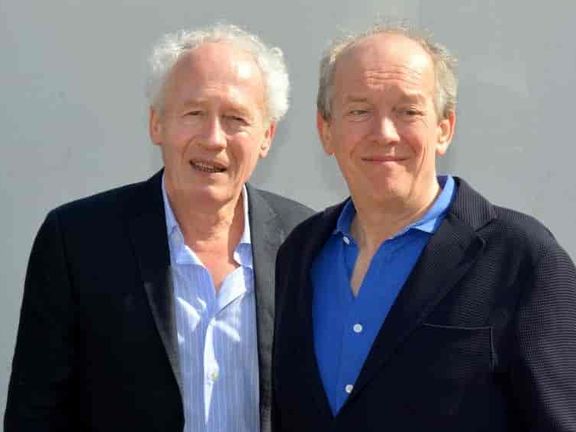
Belgian directors Jean-Pierre and Luc Dardenne have urged the Islamic Republic to remove their latest feature film "Tori and Lokita" from the poster of the Fajr International Film Festival in Tehran.
“We have just learned that our film Tori and Lokita was included in the selection of the Fajr Festival in Tehran. We demand that our film be withdrawn from the program of this festival which is the showcase of a dictatorial and murderous religious regime that we condemn. We stand in solidarity with those who are fighting against this regime and salute their courage,” said the brother in a post on Instagram.
In their statement Dardenne brothers added they were not aware of the screening of their new film at the Fajr festival in Iran, and they do not know how the Iranian regime got access to this film.
At the same time, the famous Romanian director Cristian Mungiu said he was not aware about the screening of his latest film at Fajr festival. Mungiu said he asked the film distributor to remove his film from Fajr festival immediately.
The move by prominent foreign directors comes at a time when many Iranian artists have also boycotted the festival for the brutality the regime showed in dealing with protests after the death of Mahsa Amini in police custody.
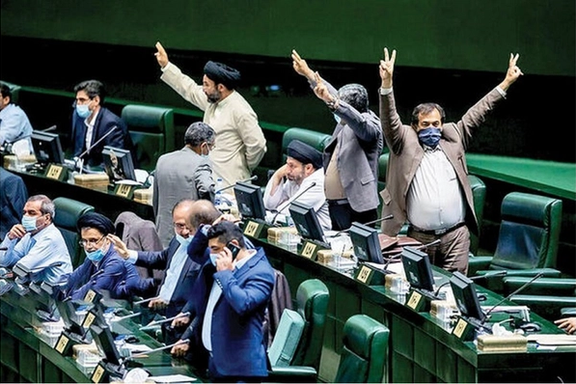
Emboldened by less street protests in January, Iran's ultra-hardliners have been pushing for further restrictions on social freedoms and freedom of expression.
Commenting on the issue of hijab, lawmaker Hossein-Ali Haji-Deligani said in an interview with Entekhab news website recently that he believes the country should have an entity dedicated to “promotion of virtue and prevention of vice” as a completely independent organization to enforce hijab. “Our society and religion do not accept today’s kind of [lenient] hijab,” he said.
Haji-Deligani who is also a member of the parliament’s presidium had said a day earlier that lawmakers, including him, had submitted a new motion to prevent celebrities and those with political, social, military or cultural influence, from “making irrelevant and inexpert statements” on the country’s affairs.
“Unrestricted expression of views is not permissible,” he said when announcing the motion’s submission.
If parliament passes the proposed law, any person of influence could be charged with ‘corruption on earth’ for making “untrue” remarks on matters requiring official clarification provided that their statements cause “serious disruption of public order, insecurity, or major physical damage to individuals, public or private property, or promote moral corruption.
‘Corruption on earth’ is punishable by death in Iran's Sharia-based laws.
The law not only will silence even insiders from criticizing a shortcoming but will eliminate whatever limited criticism appears in media. Journalists will be the top targets of such a law. Already dozens are under arrest or have face political charges.
“This means, in simple terms, that no one is allowed express any beliefs, view or even analysis [over a subject] before authorities make an official statement,” Fararu website wrote about the controversial motion. “Expressing views [over a matter] is criminal if there are rumors going around town about it, even if the rumors are true but different from the official account.”
“The problem is that lawmakers and some decisionmakers think that the events of the past few months resulted from expression of views in social media and the media. They don’t have a proper, logical and clear view of the causes of protests and think they can prevent them from happening again if they shut the mouths of critics and experts,” Nemat Ahmadi, a prominent lawyer and commentator based in Iran, told Fararu.
“As a matter of fact, I believe that this motion is not meant to prevent rumors and lies. If it turns into law, it should be called ‘The Shutting of Mouths Act’,” he added.
Haji-Deligani is a member of the parliament’s totalitarian Paydari faction which consists of members of the small but very influential Islamic Revolution Endurance Front. The party represents the most extreme right end of the conservative-hardliner spectrum collectively known as Principlists.
Supreme Leader Ali Khamenei has on many occasions eulogized the group’s mentor, Ayatollah Mohammad-Taghi Mesbah-Yazdi, who passed away two years ago.
Mesbah-Yazdi famously once said Khamenei’s rule was superior to that of the Islamic Revolution’s founder Ayatollah Ruhollah Khomeini. He also preached that Khamenei is the representative of the twelfth Shiite Imam Mahdi whose reappearance from occultation will set the day of final judgment in motion.
The faction gained dozens of seats in the current parliament in the 2020 elections with the help of the Khamenei-appointed Guardian Council which disqualified not only reformists but many of Paydari candidate’s conservative rivals.
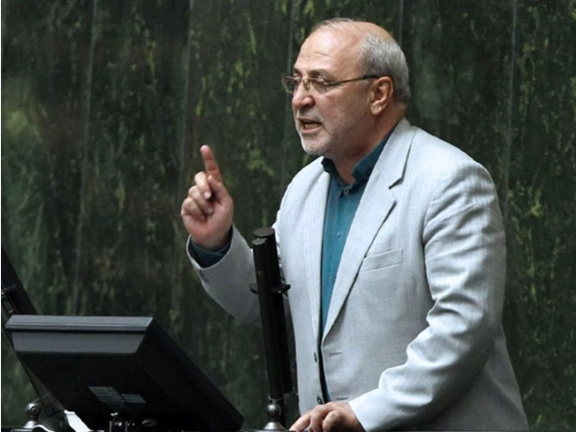
Conservative politician Mansour Haghighatpour, a former Principlist lawmaker, also criticized Paydari’s new attempt to restrict freedom of expression. “The problem is that after the last election a radical, extremist group has taken control of the parliament that does not want to hear [other] voices, views, or criticism. I mean the same group that is controlling the administration,” Haghighatpour told Fararu.
He added that this extremist group is responsible for “the majority of costs” that the Islamic Republic is now paying domestically and at the international level.
Hossein Kanaani-Moghadam, another former lawmaker and secretary general of the Principlist Green Party, also criticized Haji-Deligani’s recent remarks. “I believe such attempts would not have any outcome other than more corruption, anger, and dissatisfaction in the country.”
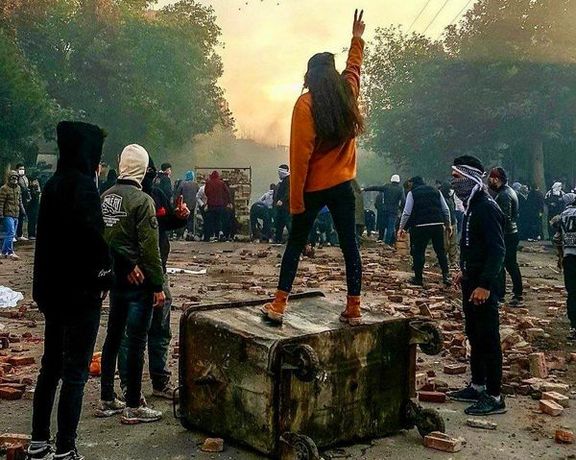
Hundreds of well-known international figures, from Nobel prize winners to movie actors, have called for support for Iranian protesters against bloody suppression.
In a petition organized by the non-profit Washington-based organization Freedom House, the signatories said that “the triumph of freedom in Iran could renew the global tide of democratization that was so strong in the latter twentieth century but has ebbed in the face of authoritarian counterattack.” “The end of the Islamic Republic’s system of misogyny would constitute a global landmark in the long march toward a world in which women are treated equally.”
The signatories include Nobel prize laureates, heads of states or government officials, members of parliaments, international organizations, as well as numerous public figures from around the world. Former UN Secretary General Ban Ki-moon; former prime ministers of Canada Stephen J. Harper, Kim Campbell and Charles Joseph Clark; and former US Secretary of State Hillary Rodham Clinton are a few of the prominent figures.
Women’s rights activists Masih Alinejad, Nazanin Boniadi, Shirin Ebadi, Azar Nafisi, Roya and Ladan Boroumand from the Boroumand Center for Human Rights in Iran, sportsman-cum- civil rights activist Ali Karimi, and Khalid Aziz from Democratic Party of Iranian Kurdistan as well as exiled prince Reza Pahlavi are some of the Iranian signatories of the petition.
They appreciated the Iranians who have taken to the streets in rebellion, noting that “the vanguard are young women, but they have been joined by men and people of all ages. With breathtaking courage and unarmed, they have kept coming, even as the regime has shot, hanged, tortured, blinded, raped, beaten, and arrested many thousands.”
Emphasizing that the Iranian people “deserve unstinting support from freedom-loving people around the world,” they called on governments, civic associations, and individuals to speak loudly and more often in support of the protestors and in condemnation of the regime’s repressive actions.
They also urged legislators to “adopt” individual arrestees, especially those facing execution, and spotlight their plight, and called on governments to “take diplomatic, economic, and symbolic measures to punish the regime and bolster the protestors.”
“All officials involved in the repression, from Supreme Leader Khamenei down to local Basij commanders, should be sanctioned," read their statement, stressing the necessity for the Revolutionary Guard (IRGC) to be added to terrorism lists.
They also asked high level officials of democratic governments to receive leaders of the opposition, in publicly-announced meetings, highlighting that accurate, reliable, fact-based reporting via international radio, television, and social media reaching Iran should be enhanced, as should assistance to private Iranian exile broadcasting.
Calling for more tangible measures, they said, “Technical assistance, including equipment, should be given to help the demonstrators counteract censorship and surveillance and to communicate despite the regime’s disruption of Internet service and blocking of websites.”
“Labor unions, governments, and others in the international community should express solidarity with Iranian workers, should share the experiences of other labor struggles for worker rights and democracy, and should also seek ways to provide practical assistance, such as VPNs, other means of communication, and contributions to strike funds if safe and effective channels can be found,” they urged.
Pledging to do all in their power to support the Iranian struggle for freedom, they called upon all people of good will everywhere to join them.
Referring to over four months of protests, they said, “The spark was mandatory hijab, but the target of the uprising is the whole theocratic system. Their slogan is Woman, Life, Freedom. The goal they chant is 'Azadi, Azadi, A-za-di,' meaning 'Freedom, Freedom, Freedom.’ Their victory would mean deliverance from a regime that denies free elections, free speech, due process of law, and personal autonomy in matters as simple as the choice of clothing.
International expressions of support for the uprising in Iran is growing as the West has stepped up pressure on the Islamic Republic over its crackdown on protests and arms supply for the Russian invasion of Ukraine as the US, European Union and United Kingdom imposed fresh sanctions on Tehran with more sanctions and condemnations being discussed regularly in the international arena. One of the main points of contention is the terrorist designating of the IRGC, which is in control of most of the governing bodies of the regime, is mainly in charge of the crackdown on dissent, and manages the Islamic Republic’s proxy warfare across the region and hostage diplomacy at home.
The crackdown has become especially tense in Kurdish and Baluch majority regions as the regime has arrested at least 182 Kurds and 185 Balochis in January alone.
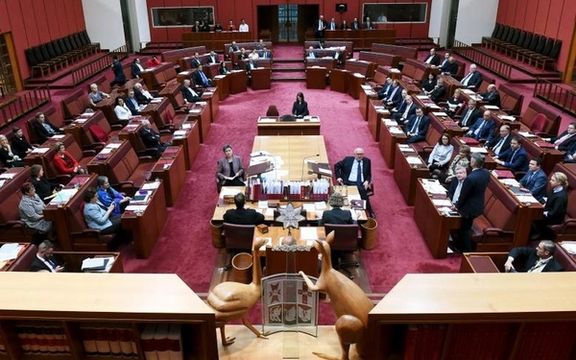
The Australian senate has called on the government to designate Iran’s Revolutionary Guard as a terrorist organization and impose further sanctions on the regime’s officials.
In a 128-page report on the current protests across Iran condemning institutionalized oppression of women and the Islamic Republic’s brutal response to quell the uprising, the senate decried the use of live ammunition and indiscriminate force by security agents against civilians.
The Foreign Affairs, Defense and Trade References Committee, which issued the report, urged the Australian Government to be unequivocal in its response to violence and human rights abuses in Iran, adding that “whilst Iran’s future must ultimately be written by the people of Iran in its own streets, the protection of human rights is a moral obligation and a practical necessity for us all.”
The committee, reporting on behalf of the senate, said that “evidence presented to the committee painfully illustrates the wholesale maltreatment of a nation by the very authorities whose job it is supposed to be to safeguard and protect the Iranian population.”
“Hundreds have been killed and many thousands wounded. Tens of thousands have been arrested. A number have been sentenced to death—some already executed—without access to a fair trial. Confessions are extracted through torture. Adults and children are subjected to horrific physical and sexual abuse in prison,” read part of the report, titled “Human rights implications of recent violence in Iran.”
Having studied a very large sample of submitted reports and evidence, the report made a series of recommendations designed to hold accountable a regime for abusing its own people, and reduce the Islamic Republic’s ability to violate human rights without consequence.
The committee recommended that the Australian Government take the necessary steps to formally categorize the IRGC as an organization involved in supporting and facilitating terrorism, also calling for the use of sanctions to target Islamic Republic and IRGC-affiliated individuals and entities responsible for malicious cyber activity against Australia.
It also urged the government “to use the available Magnitsky legislation to expand the list of individuals and entities subject to sanctions in response to human rights abuses in Iran, with particular focus on senior officials responsible for violence, human rights abuses, arbitrary detention and executions without due process.”

The document also called on Canberra to oppose the election of the Islamic Republic to United Nations’ bodies in light of the regime’s clear disregard for human rights, it said, particularly the rights of women and girls.
The senate also expressed concerns about credible allegations of intimidation and threats against Australian citizens, residents and their families, urging the responsible government ministers to provide an update to the Parliament and the Australian public on the government’s current assessment of whether persons connected to the regime are undertaking such behavior in Australia.
The committee also recommended that Australia should minimize relations with the Islamic Republic to “the greatest extent possible in recognition of the appalling behavior of the regime,” adding that the government should increase transparency and better inform the public about the status of its diplomatic relations with Tehran, as well as the security concerns in relation to the regime’s behavior relating to cybercrime, hostage diplomacy and threats to Australian residents.
“Implementing the committee’s recommendations would place Australia more firmly in the community of nations which have heard the Iranian people cry: Enough,” read the report, acknowledging that “Australia lagged well behind many of our partner Western democracies in taking action to send a clear unambivalent message to the Iranian regime that what they are doing is grossly unacceptable.”
The West has stepped up pressure on Iran over its crackdown on protests and arms supply for the Russian invasion of Ukraine as the US, European Union and United Kingdom imposed fresh sanctions on Tehran.
Earlier in the day, US Special Envoy for Iran Robert Malley said that “all corners of the Biden Administration have worked urgently and powerfully to mobilize the international community and confront the Iranian regime’s human rights abuses.”
On Tuesday, US lawmaker Representative Claudia Tenney (Rep-NY) reiterated, “We must impose the strictest sanctions possible on the leaders of the murderous Iranian regime, which is the world’s leading state sponsor of terrorism.”